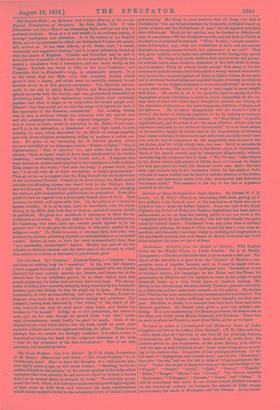The Great Problem : Can it he Solved? By C.
R. Gleig, Prebendary of St. Paul's. (Blackwood and Sons).—" The Great Problem" is—Is Christianity true? Here we have the thoughts of a well-known man, now eighty years of age, on this great subject. "Standing," as he de- scribes himself in his preface," on the narrow portion of the ledge which separates time from eternity, he can have no object in writing as he has done but an earnest desire to promote the truth." We sincerely recom- mend the book, which, if it does not contain anything strikingly original, at least sums up with force and clearness the main considerations which almost compel a belief in the substantial truth of Christ's mission
and teaching. Mr. Gleig is most anxious that all those who find in Christianity "the one thing necessary for humanity, a religion based on purity of heart and the brotherhood of man," should agree to minimise their differences. Much, in his opinion, may be doubted or disbelieved, even in connection with the Scripture records, and yet faith in Christ as the Saviour of mankind be retained. "What," he asks, " are the constitu- tions of Churches, nay, what are confessions of faith and sacraments themselves, except means towards the attainment of an end?" That end, as he explains, is to make men partakers of the loving, holy nature
of Christ. Mr. Gleig very much dislikes that controversial and polemi- cal attitude which some would-be defenders of the faith think it neces-
sary to assume. While be admits freely enough that many of the dis- coveries of modern science have been put to a wrong use and unwarrant- ably turned into weapons against all belief in higher truths, he scruples not to attribute the hesitating and sceptical temper of society on religions questions "to the dogged obstinacy of worn-out orthodoxy," as much as to any other cause. The words of such a man ought to carry weight with them. He seems to us to be perfectly right in saying that the dogmatism of some Christians is quite as much responsible for the un- easy state of mind into which many thoughtful persons are falling, as the objections of Strauss or the more dangerous infidelity of Renan and his followers. Ho is rather disappointed with Dr. Farrar's "Life of Christ," the defect of which he considers to be its making no attempt to explain the purpose of Christ's mission. Of "Ecce Home" he speaks appreciatingly, and describes it as "the most effective tribute that has anywhere been paid to the ethics of Christianity." It is on these ethics, on the morality taught by Christ, and on the impossibility of believing that, under existing circumstances and influences, morality could have ever won its way to acceptance on the supposition that its source was not divine, that Mr. Gleig chiefly rests his case. Belief in miracles he holds not to be essential to a belief in the divine origin of Christianity. Much of the sacred records may be interpreted allegorically, without surrendering the reverence duo to them. "We," he says, "who believe in the divine nature and mission of Christ, do so not because he healed the sick and raised the dead, but because never man spake like this man,' and because only in the revelation which he has made of God's will and of man's destiny can be found a rational solution of the doubts, and fears, and aspirations which from time immemorial had distracted the human mind." This sentence is the key to the line of argument pursued in this book.






























 Previous page
Previous page